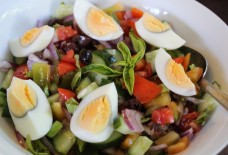The New Museum Surveys Art From the Arab World
The Western media’s obsession with Middle Eastern conflict has made it easy for American audiences to mistake war and crisis as components of Arab identity. But if there’s anything that the New Museum’s newest exhibition, “Here and Elsewhere,” works to dispel, it’s the fallacy that any single portrayal can summarize the many cultural landscapes around and within the Arabian peninsula.
The exhibition, which opens Wednesday and runs until Sept. 28, documents the work of 45 contemporary artists of Arab origin, marking the first-ever museumwide group show of Arab artists in New York City. The show’s curators were careful to avoid making any blanket statements about art from the Arab world. “We’re looking at a very diverse group of artists who share a fascination with the question of truth through images,” says Massimiliano Gioni, the New Museum’s associate director and the exhibition’s co-curator. “This question is also a question of what constitutes an identity, and how an identity like Arab is constructed through images.”
Gioni began culturing the idea for “Here and Elsewhere” when he noticed that artists from the Arab world were primarily featured by biennials, which are rich in diversity but lack the space to thoroughly showcase specific cultures. In bringing the idea to life, providing multiple Arab artists a museum backdrop was one main goal; coordinating it in the center of the art world’s capital city was another. “This is part of a natural series of exhibitions we like to feature in the New Museum — ones that not only look at art from a specific geographical place, but art that isn’t being made or shown in New York,” says Gioni.
For some of the featured artists, documenting the trials faced by Arab people in the wake of war or other tragedies is a key method for probing concepts of identity. Bouchra Khalili’s films, for example, circle the lives of Arab immigrants as they leave their lineages in pursuit of new beginnings in Europe and abroad. Fouad Elkoury’s photography captures Lebanese families and country clubs before and after the start of Lebanon’s 15-year civil war. And while other artists’ works take even more divisive approaches toward cataloging the Arab experience, like Rokni Haerizadeh’s paintings of animal-human hybrids protesting Islam in the streets of contemporary France, each of the 45 artists are ultimately united by a shared fascination with what it means to be alive and human in the modern era, regardless of ethnic labels. That’s why, says Gioni, American visitors have just as much to gain from the exhibition as do visitors from Arab countries. “If we go to an exhibition to see ourselves reflected in another people, and in another culture, the museum process becomes much more interesting,” he said. “I think that is ultimately what makes art beautiful. To not just function as a picture, but as a portal.”
“Here and Elsewhere” is on view July 16 to Sept. 28 at the New Museum, 235 Bowery, New York, newmuseum.org.
NY Times
Johnny Magdaleno


